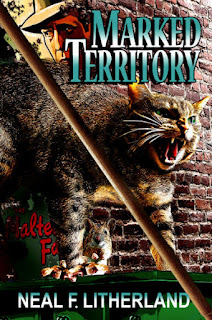One thing that often gets left out, though, are our characters' hobbies. Their interests. Those things they do to fill their lives when they're not solving serial murders, or casting ancient rites, or trying to work up the courage to talk to the girl in their English 301 class who seems totally out of their league.
 |
| I am a poet. A lover. A linguist. Surely she will go to prom with me... |
These are, in retrospect, the little parts of our characters' lives. It's the music they like, the books they read, the crafts they do on their days off. Things that bring them down to earth, and which ground them. And while they might not always be the focus of a dramatic scene, including them can often make our characters seem that much more human... even if the characters are not, in fact, human.
And before we go any further, consider signing up for my weekly newsletter. Also, if you want to help the wheels keep turning, consider becoming one of my Patreon patrons as well!
Cats Need Hobbies, Too, You Know
If you've read any of the Spenser For Hire series by Robert B. Parker, then chances are good you already know about some of the main character's side interests. He reads a lot of literature, he cooks rather elaborate meals, and he's passably learned in the science of psychology (at least partially due to his love interest, Dr. Silverman). I took a queue from this work when designing my own hard-nosed detective, even if Leo has four legs and a bottle brush tail.
 |
| Just saying. |
If you haven't read either Marked Territory or Painted Cats yet, and you're a fan of noir mysteries, I'd highly recommend giving both of them a look. But if you're familiar with the tropes of the genre, then you already know a lot of stuff about Leo, our Maine coon protagonist. You know he's a big bruiser who talks a tough game, and while some of it might just be bluster, most of it isn't. You know he tries to keep his nose out of other people's business, but something always ends up getting him involved in stuff he'd rather not be part of. And he's got a complicated past with at least a couple of old flames in it, like Delilah who starts the events of Painted Cats in motion.
Throughout both books, though, we get a sense of what Leo does in his spare time when he isn't actively involved in life-and-death problems with New York City's various street beasts. We know he likes to tour street performers, for example, and that he enjoys various takes on classical music when he can find it. He likes Shakespeare, though he most often sees it performed in the park. He really doesn't care for heavy metal, though his cohort Lucky has a particularly favorite band Leo has to tolerate from time to time to get his help. He is fully aware of how social media works, and since cats don't have money, he does what he can to help artists he likes by being filmable while they perform so people check them out.
This isn't the bulk of Leo's time in the books (he has cases to pursue, after all), but he always takes time in the lulls for the audience to follow him around. It gives us a sense of who he is the rest of the time, when he isn't running down leads or roughing up bully boys who are trying to move in on someone else's territory. Sometimes it leaves readers curious (I've had more than one person ask why he seems so well-read, and there is a reason I'm building toward for that), and sometimes it makes them laugh (Leo attacking a balloon-cat to boost the artist's Internet presence got quite a giggle from one reader), but it always shows another aspect of your character.
And often it's these side aspects that balance them out. That makes them feel more organic, and less like just a jumble of special powers, or stated motivations, or action scenes. Because the little moments bring us in close, and they can make the bigger, more outlandish stuff seem that much more believable.
Like, Follow, and Come Back Again!
That's all for this week's Craft of Writing! For more of my work, check out my Vocal archive, or at My Amazon Author Page where you can find books like my cat noir novel Marked Territory, its sequel Painted Cats, my sword and sorcery novel Crier's Knife, or my most recent short story collection The Rejects!
And to stay on top of all my latest news and releases, collected once a week, make sure you subscribe to The Literary Mercenary's mailing list.
If you'd like to help support my work, then consider Buying Me A Ko-Fi, or heading over to The Literary Mercenary's Patreon page! Lastly, to keep up with my latest, follow me on Facebook, Tumblr, Twitter, and now on Pinterest as well!






